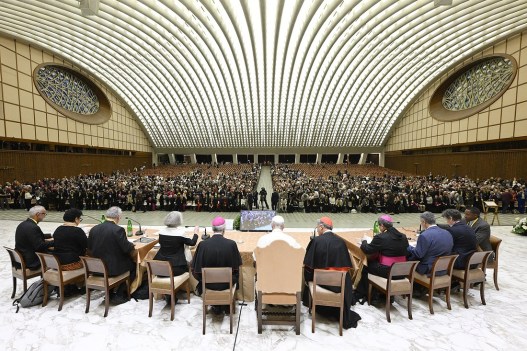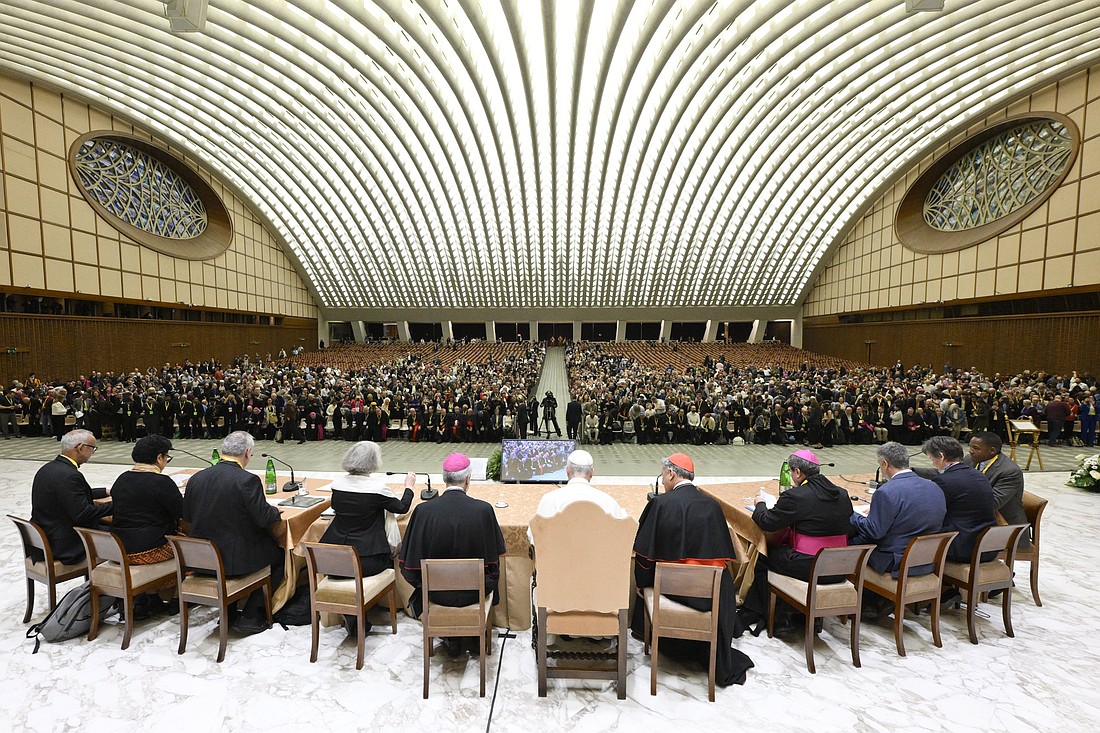On the weekend of October 24-26, 2025, the Vatican sponsored a Holy Year event called the Jubilee of Synodal Teams and Participatory Bodies, which brought together thousands of Catholics from around the globe who helped organize events and consultations for the Synod on Synodality between 2021 and 2024. The 2025 event consisted of traditional pilgrimage activities, but also an audience with Pope Leo XIV and a meeting of 2,000 participants to hear an update on the synodal process and to ngage in synodal discussion .
The following essay is a reflection on that experience by Robert Choiniere, D.Min, who has served as a professor of theology at Fordham University and was also the Director of Adult Formation at the Church of St. Francis Xavier, Manhattan. Bob also has an extensive background in pastoral planning and ecclesial consultation, including work in the Diocese of Brooklyn, Archdiocese of Philadelphia, and Diocese of Wheeling-Charleston, West Virginia. He is the former chair of the Conference of Pastoral Planning and Council Development.
When first invited to write a reflection on my participation as a gay Catholic man at the recent Jubilee for Synodal Teams and Participatory Bodies at the Vatican, I was hesitant because I was at a loss for any poignant antidotes or experiences that would be relevant to my sexual identity at this worldwide gathering of the more than 2,000 diocesan delegates and leaders who assisted in the three- year synodal process that began with the largest consultation in human history and culminated in a final document that instantly became magisterial teaching by Pope Francis.


Pope Leo and church leaders preside over session in Paul VI Audience Hall during the Jubilee of Synodal Teams.
I drew a blank despite the consistent, repetitive theme in synod conversations and reports which called for greater inclusion of LGBTQ+ Catholics heard from every corner of the globe. The topic came up during the local consultation process, it emerged through the clarion calls for the recognition of LGBTQ+ Catholics relationships and families echoed in every continental report, and was obvious when the Vatican’s Synod office website posted a public apology for having suddenly removed a video of a New Ways Ministry sponsored webinar on synodality. (Along with the apology, the video was restored to the site.)
Yet, if you attended the Jubilee event for synod teams in Rome last weekend, you would have no idea that LGBTQ+ Catholics were a major theme of the synod or that we even exist. We were absent from all discussions. We had no representation Perhaps not intentionally excluded, but certainly not recognized, not intentionally included.
LGBTQ+ Catholic groups who had sponsored synodal conversations, such as New Ways Ministry and DignityUSA, had been invited to attend the event, and their representatives were there. At the Jubilee registration desk, participants were handed one of two different ID cards. A yellow card was given to people who, though they officially served the Synod, were not from groups authorized by their local bishops. A green card was given to people who had such local authorization. Green card holders were allowed to participate in all the event sessions. Yellow card holders were allowed to walk through the holy door and attend mass, but nothing else.
I had a green card which I only received with special permission from the Vatican because of my work on church consultations. Therefore, I was allowed to attend a meeting led by Pope Leo and heard the global update on the status of synod implementation. LGBTQ Catholics were never mentioned. 2,000 participants sat in seats fairly close to one another in a mostly empty audience hall made for 6,000. People with the yellow cards were not allowed in.
During the first session of the General Assembly of the Synod in October 2023, Cardinal Joseph Tobin of Newark, New Jersey, told a story at one of the daily press briefings about a mass for LGBTQ+ Catholics at the Newark cathedral. He proudly shared the words of his homily that day: “the Church is at her best when the doors are open.” It was an inspiring moment, a sign that perhaps institutional exclusion built by centuries of tradition might be upended.
I believe Cardinal Tobin is sincere in his desire to open the doors of the Church to all. I believe the Synod officials felt that offering a yellow card option was better than nothing. But if I am being honest, when I was admitted with my green card I felt special. When I was moved from row 15 to row 4, I felt important. I forgot my concern for the folks with the yellow cards. They were behind me. I was past the gate, my eyes forward.
As Catholics we are immersed in a Vatican culture that creates specialness through exclusion. It is an insidious phenomenon. My inclusion should not be predicated on another’s exclusion. My specialness should not be created by denying access to others. The Synod was meant to usher in a new era rooted in the open-door philosophy of Cardinal Tobin. But, for three years, behind gates and guards, select delegates had secret discussions about inclusion and then they held an exclusive jubilee party to celebrate.
I still believe full inclusion is possible, but it will not be realized through the Church’s current methods but despite them. It will happen when the few refuse their privilege and stand in solidarity with those they must pass by on their way to special inclusion. I believe this is possible because the Gospel itself proclaims with great hope that Christianity is made to include everyone unto the far corners of the earth.
—Robert Choiniere, November 1, 2025
Editor: Today is the feast of All Saints. If you would like to reflect on the liturgical readings for today, check out the All Saints installment of New Ways Ministry’s online resource, Journeys: A Scripture Reflection Series for LGBTQ People and Allies.
Related
